Ukrainians in Russia
This article may require copy editing for grammar, style, cohesion, tone, or spelling. (April 2021) |
This article needs additional citations for verification. (August 2017) |
| Total population | |
|---|---|
| Languages | |
| Russian (99.8%, 2002), Ukrainian | |
| Religion | |
| Predominantly Christians (55%).[2][3] | |
| Related ethnic groups | |
| Kuban Cossacks, Ukrainian diaspora, other Slavic peoples (especially East Slavs) |
Ukrainians in Russia make up the largest single diaspora group of the Ukrainian people. As of 2010, 1.9 million Ukrainians live in Russia, representing over 1.4% of the total population of the Russian Federation and comprising the third-largest ethnic group after ethnic Russians and Tatars. An estimated 340,000 people born in Ukraine, mostly young people, permanently settle legally in Russia each year.[4] In February 2014, there were 1.6 million Ukrainian citizens in the territory of Russia, two-thirds of the labour migrants. However, after the Russian annexation of Crimea and the start of the War in Donbas, the number had risen to 2.5 million as of December 2014.[5] Over 420,000 asylum-seekers from Ukraine had registered in Russia as of November 2017.[6]
History
17th and 18th centuries
This section needs additional citations for verification. (March 2021) |
After the Treaty of Pereyaslav of 1654, migration to Russia from Ukraine increased. Initially, this was to Sloboda Ukraine, but also to the Don lands and the area of the Volga river. There was also a significant migration to Moscow, particularly by church activists, priests and monks, scholars and teachers, artists, translators, singers, and merchants. In 1652, twelve singers under the direction of moved to Moscow, and thirteen graduates of the Kyiv-Mohyla Collegium moved to teach the Moscovite gentry. Many priests and church administrators migrated from Ukraine; in particular, the established was made up of Ukrainian clergy.[7] This had a great effect on the Russian Orthodox Church, in particular the policies of Patriarch Nikon which led to the Old Believer Raskol (schism). The influence of Ukrainian clergy continued to grow, especially after 1686, when the Metropolia of Kyiv was transferred from the Patriarch of Constantinople to the Patriarch of Moscow.
Soon after, the abolishment of the Patriarch's chair by Peter I, the Ukrainian Stephen Yavorsky became Metropolitan of Moscow, followed by Feofan Prokopovich. Demetrius of Rostov became of Tobol and Siberia, and from 1704 Rostov and Yaroslavl. In all, over 70 positions in the Orthodox hierarchy were taken by recent emigres from Kyiv.[8] Students of the Kyiv-Mohyla Collegium started up schools and seminaries in many Russian eparchies. By 1750, over 125 such institutions were opened. As a result, these graduates practically controlled the Russian church, obtaining key posts there and holding them to almost the end of the 18th century. Under Prokopovich, the Russian Academy of Sciences was opened in 1724, which was chaired from 1746 by Ukrainian Kirill Razumovsky.[8]
The Moscow court had a choir established in 1713 with 21 singers from Ukraine. The conductor for a period of time was . In 1741, 44 men, 33 women, and 55 girls were moved to St. Petersburg from Ukraine to sing and entertain. Composer Maksym Berezovsky also worked in St. Petersburg at the time. A significant Ukrainian presence was also seen in the Academy of Arts.
The Ukrainian presence in the Russian Army also grew significantly. The greatest influx happened after the Battle of Poltava in 1709. Large numbers of Ukrainians settled around St Petersburg and were employed in the building of the city.
A separate category of emigrants were those deported to Moscow by the Russian government for demonstrating anti-Russian sentiment. The deported were brought to Moscow initially for investigation, then exiled to Siberia, Arkhangelsk or the Solovetsky Islands. Among the deported were Ukrainian cossacks including D. Mhohohrishny, Ivan Samoylovych, and Petro Doroshenko. Others include all the family of hetman Ivan Mazepa, A. Vojnarovsky, and those in Mazepa's Cossack forces that returned to Russia.[citation needed] Some were imprisoned in exile for the rest of their lives, such as hetmanPavlo Polubotok, Pavlo Holovaty, P. Hloba and Petro Kalnyshevsky.
19th century
This section needs additional citations for verification. (March 2021) |


Beginning in the 19th century, there was a continuous migration from Belarus, Ukraine and Northern Russia to settle the distant areas of the Russian Empire. The promise of free fertile land was an important factor for many peasants, who until 1861 lived under serfdom. In the colonization of the new lands, a significant contribution was made by ethnic Ukrainians. Initially Ukrainians colonised border territories in the Caucasus. Most of these settlers came from Left-bank Ukraine and Slobozhanshchyna and mainly settled in the Stavropol and Terek areas. Some compact areas of the Don, Volga, and Urals were also settled.
The Ukrainians created large settlements within Russia, becoming the majority in certain centres. They continued fostering their traditions, their language, and their architecture. Their village structure and administration differed somewhat from the Russian population that surrounded them.[9] Where populations were mixed, Russification often took place.[9] The size and geographical area of the Ukrainian settlements were first seen in the course of the Russian Empire Census of 1897. This census noted only language, not ethnicity. Nonetheless, a total of 22,380,551 Ukrainian speakers were recorded, with 1,020,000 Ukrainians in European Russia and 209,000 in Asian Russia.[note 1]
20th century
Formation of Ukrainian borders
This section needs additional citations for verification. (March 2021) |

The first Russian Empire Census, conducted in 1897, gave statistics regarding language use in the Russian Empire according to the administrative borders. Extensive use of Little Russian (and in some cases dominance) was noted in the nine south-western Governorates and the Kuban Oblast.[10] When the future borders of the Ukrainian state were marked, the results of the census were taken into consideration. As a result, the ethnographic borders of Ukraine in the 20th century were twice as large as the Cossack Hetmanate that was incorporated into the Russian Empire in the 17th.[11]
Certain regions had mixed populations made up of both Ukrainian and Russian ethnicities, as well as other minorities. These included the territory of Sloboda and the Donbas. These territories were between Ukraine and Russia. This left a large community of ethnic Ukrainians on the Russian side of the border. The borders of the short-lived Ukrainian People's Republic were largely preserved by the Ukrainian SSR.
In the course of the mid-1920s administrative reforms, some territory initially under the Ukrainian SSR was ceded to the Russian SFSR, such as the Taganrog and Shakhty cities in the eastern Donbas. At the same time, the Ukrainian SSR gained several territories that were amalgamated into the Sumy Oblast in Sloboda region.
Ukrainian life in post-Soviet Russia
This section needs additional citations for verification. (March 2021) |
The Ukrainian cultural renaissance in Russia began at the end of the 1980s, with the formation of the in Moscow and the Ukrainian Cultural Centre named after T. Shevchenko in Leningrad (now Saint Petersburg).
In 1991, the organized a conference in Kyiv with delegates from the various new Ukrainian Community organizations of the Eastern Diaspora. By 1991, over 20 such organizations were in existence. By 1992, 600 organizations were registered in Russia alone. The Congress helped to consolidate the efforts of these organizations. From 1992, regional congresses began to take place, organized by the Ukrainian organizations of Prymoria, Tyumen Oblast, Siberia and the Far East. In March 1992, the was founded. The was founded in May 1992.
The term "Eastern Diaspora" has been used since 1992 to describe Ukrainians living in the former USSR, as opposed to the which was used until then to describe all Ukrainian diaspora outside the Union. The Eastern Diaspora is estimated to number approximately 6.8 million, while the Western Diaspora is estimated to number approximately 5 million.
In February 2009, about 3.5 million Ukrainian citizens were estimated to be working in the Russian Federation, particularly in Moscow and in the construction industry.[12] According to Volodymyr Yelchenko, the Ambassador of Ukraine to the Russian Federation, there were no state schools in Russia with a program for teaching school subjects in the Ukrainian language as of August 2010; he considered "the correction of this situation" as one of his top priority tasks.[13]
As of 2007, the number of Ukrainian illegal immigrants in Russia has been estimated as being between 3–11 million. As many Ukrainians entered illegally, the true number of Russian Ukrainians is unknown. Many Ukrainians have been viewed as illegal immigrants and criminals, and many complain of racism. Some have compared this to how Mexicans are viewed in the United States.[14]
In a 2011 poll, 49% of Ukrainians said they had relatives living in Russia.[15]
Events since 2014
During and after the 2014 annexation of Crimea by Russia and the Russian military intervention in Ukraine, Ukrainians living in Russia complained of being labelled a "Banderite" (follower of Stepan Bandera), even when they are from parts of Ukraine where Stephan Bandera has no considerable support.[16]
Starting from 2014, a number of Ukrainian activists and organisations were prosecuted in Russia based on political grounds. Some notable examples include the case of Oleg Sentsov, which was described by Amnesty International as a "Stalinist era trial",[17] the closure of a Ukrainian library in Moscow and prosecution against the staff of the library,[18] and a ban of Ukrainian organisations in Russia, such as Ukrainian World Congress.[18]
As of September 2015, there were 2.6 million Ukrainians living in Russia, more than half of them "guest workers". A million more had arrived in the past eighteen months.[19] (although critics have accused the FMS and media of circulating exaggerated figures).[20][21] About 400,000 had applied for refugee status and almost 300,000 had asked for temporary residence status, with another 600,000 considered to be in breach of migration rules.[19] By November 2017, there were 427,240 applicant asylum-seekers and refugees from Ukraine registered in Russia,[6] over 185,000 of them having received temporary asylum, and fewer than 590 with refugee status.[22] The refugees were from the territories of Donetsk and Luhansk People's Republics taken over by pro-Russian separatists since the War in Donbas. Most refugees have headed to rural areas in central Russia. Major destinations for Ukrainian migrants have included Karelia, Vorkuta, Magadan Oblast; oblasts such as Magadan and Yakutia are destinations of a government relocation program since the vast majority avoid big cities.[23]
Anti-Ukrainian sentiment
Ukrainians in the Russian Federation represent the third largest ethnic group after Russians and Tatars. In spite of their relatively high numbers, some Ukrainians in Russia complain[when?] of the unfair treatment and the prevailing anti-Ukrainian sentiment in the Russian Federation.[24][25] In November 2010, the High Court of Russia cancelled registration of one of the biggest civic communities of the Ukrainian minority, the "" (FNCAUR).[26]
A survey, conducted by the independent Russian research centre Levada in February 2019, found that 77% of Ukrainians and 82% of Russians think positively of each other as people.[15]
Religion
The vast majority of Ukrainians in Russia are adherents of the Russian Orthodox Church. The Ukrainian clergy had a very influential role on Russian Orthodoxy in the 17th and 18th centuries.
Recently,[when?] the growing economic migrant population from Galicia have had success in establishing a few Ukrainian Catholic churches, and there are several churches belonging to the Ukrainian Orthodox Church (Kyiv Patriarchate), where Patriarch Filaret agreed to accept breakaway groups that had been excommunicated by the Russian Orthodox Church for breaches of canon law. Some asserted in 2002, that Russian bureaucracy regarding religion has hampered the expansion of the two groups above.[27] According to the Ukrainian Greek Catholic Church, their denomination has only one church building in all of Russia.[28]
Compact Ukrainian population centres in Russia




Kuban
The original Black Sea Cossacks colonised the Kuban region from 1792. Following the Caucasus War and the subsequent colonisation of the Circaucasus, the Black Sea Cossacks intermixed with other ethnic groups, including the indigenous Cirsassian population.
According to the 1897 census, 47.3% of the Kuban population (including extensive latter 19th-century non-Cossack migrants from both Ukraine and Russia) referred to their native language as Little Russian (the official term for the Ukrainian language), while 42.6% referred to their native language as Great Russian.[29] Most of the cultural production in Kuban from the 1890s until the outbreak of World War I in 1914, such as plays, stories and music were written in the Ukrainian language,[30] and one of the first political parties in Kuban was the Ukrainian Revolutionary Party.[30] During the Russian Civil War with the Kuban Cossack Rada desperate for survival, turned to the Ukrainian People's Republic and formed a military alliance, as well as declaring Ukrainian to be the official language of the Kuban National Republic. This decision was not supported uniformly by the Cossacks themselves, and soon the Rada itself was dissolved by the Russian White Denikin's Volunteer Army.[30]

In the 1920s, a policy of Decossackization was pursued. At the same time, the Bolshevik authorities supported policies that promoted the Ukrainian language and self-identity, opening 700 Ukrainian-language schools and a Ukrainian department in the local university.[31] Russian historians claim that Cossacks were in this way forcibly[32] Ukrainized, while Ukrainian historians claim that Ukrainization in Kuban merely paralleled Ukrainization in Ukraine itself, where people were being taught in their native language. According to the 1926 census, there were nearly a million Ukrainians registered in the Kuban Okrug alone (or 62% of the total population)[33] During this period many Soviet repressions were tested on the Cossack lands, particularly the Black Boards that led to the Soviet famine of 1932-1934 in the Kuban. Yet by the mid-1930s there was an abrupt policy change of Soviet attitude towards Ukrainians in Russia. In the Kuban, the Ukrainization policy was halted and reversed.[34] In 1936 the Kuban Cossack Chorus was however re-formed as were individual Cossack regiments in the Red Army. By the end of the 1930s many Cossacks' descendants chose to identify themselves as Russians.[35] From that moment onwards, almost all of the self-identified Ukrainians in the Kuban, date to non-Cossacks, the Soviet Census of 1989 showed that a total of 251,198 people in Krasnodar Kray (including Adyghe Autonomous Oblast) who were born in the Ukrainian SSR,[36] and moved there by time of census. In the 2002 census, the number of people who identified themselves as Ukrainians in the Kuban was recorded to be 151,788. Despite the fact that most of the Kuban Cossacks descendants do not think of themselves as being nationally Ukrainians, and identify themselves as Russian nationals.,[37] many elements of their unique culture originates from Ukraine, such as the Kuban Bandurist music, and the dialect called Balachka which they speak.
Moscow
This section needs additional citations for verification. (March 2021) |
Moscow has had a significant Ukrainian presence since the 17th century. The original Ukrainian settlement bordered Kitai-gorod. No longer having a Ukrainian character, it is today is known as Maroseyka (a corruption of Malorusseyka, or Little Russian). During Soviet times the main street, Maroseyka, was named after the Ukrainian Cossack hetman Bohdan Khmelnytsky. After Moscow State University was founded in 1755, many students from Ukraine studied there. Many of these students had commenced their studies at the Kyiv-Mohyla Academy.
In the first years after the revolution of 1905, Moscow was one of the major centres of the Ukrainian movement for self-awareness. The magazine Zoria was edited by , and from 1912 to 1917 the Ukrainian cultural and literary magazine "Ukrainskaya zhizn'" was also published there edited by Symon Petliura. Books in the Ukrainian language were published in Moscow from 1912 and Ukrainian theatrical troops of and were constantly performing there.
Moscow's Ukrainians played an active role in opposing the attempted coup in August 1991.[38]
According to the 2001 census, there are 253,644 Ukrainians living in the city of Moscow,[39] making them the third largest ethnic group in that city after Russians and Tatars. A further 147,808 Ukrainians live in the Moscow region. The Ukrainian community in Moscow operates a cultural centre on Arbat Street, whose head is appointed by the Ukrainian government.[40] It publishes two Ukrainian-language newspapers and has organized Ukrainian-language Saturday and Sunday schools.
Saint Petersburg
When Saint Petersburg was the capital during the Russian Empire era, many people from all nations including Ukrainians moved there. The Ukrainian poets Taras Shevchenko and Dmytro Bortniansky spent most of their lives in Saint Petersburg. Ivan Mazepa, carrying out the orders of Peter I, was responsible for sending many Ukrainians to help build St Petersburg, where they died on a massive scale.[41]
According to the latest census, there are 87,119 Ukrainians living in the city of St Petersburg, where they constitute the largest non-Russian ethnic group.[42] The former Mayor, Valentina Matviyenko (née Tyutina) was born in Khmelnytskyi Oblast of western Ukraine and is of Ukrainian ethnicity.[verification needed]
Zeleny Klyn
Zeleny Klyn is often referred to as Zelena Ukraina. This is an area of land settled by Ukrainians which is a part of Far Eastern Siberia, located on the Amur River and the Pacific Ocean. It was named by the Ukrainian settlers. The territory consists of over 1,000,000 square kilometres and had a population of 3.1 million in 1958. The Ukrainian population in 1926 made up 26% of the population.[citation needed] In the last Russian census, 94,058 people in Primorsky Krai claimed Ukrainian ethnicity,[43] making Ukrainians the second largest ethnic group and largest ethnic minority.
Siry Klyn
The Ukrainian settlement of Siry Klyn, literally the "grey wedge", developed around the city of Omsk in western Siberia. M. Bondarenko, an emigrant from Poltava province, wrote before World War I: "The city of Omsk looks like a typical Moscovite city, but the bazaar and markets speak Ukrainian". All around the city of Omsk stood Ukrainian villages. The settlement of people beyond the Ural mountains began in the 1860s. There were attempts to form an autonomous Ukrainian region in 1917-1920. Altogether before 1914 1,604,873 emigrants from Ukraine settled the area. According to the 2010 Russian census, 77,884 people of the Omsk region identified themselves as Ukrainians, making Ukrainians the third-largest ethnic group there after Russians and Kazakhs.[44]
Zholty Klyn
The settlement of Zholty Klyn (the Yellow Wedge) was founded soon after the Treaty of Pereyaslav of 1659 as the eastern border of the second Zasechnaya Cherta. Named after the yellow steppes on the middle and lower Volga, the colony co-existed with the Volga Cossacks, and colonists primarily settled around the city of Saratov. In addition to Ukrainians, Volga Germans and Mordovians migrated to Zholty Klyn in numbers. As of 2014 most of the population is integrated throughout the region, though a few "pure" Ukrainian villages remain.[45]
Demographics
Statistics and scholarship
This section needs additional citations for verification. (March 2021) |
Statistical information about Ukrainians in the Eastern diaspora from census materials of the Russian Empire, the Soviet Union and the Russian Federation was collected in 1897, 1920, 1923, 1926, 1937, 1939, 1959, 1970, 1979, 1989, 2002 and 2010. Of which, only the 1937 census has been discarded and a semi-fixed 1939 census was carried out.
In the aftermath of the breakup of the Soviet Union in 1991, attention has been focused on the Eastern Ukrainian diaspora by the Society for relations with Ukrainians outside of Ukraine. Numerous attempts have been made to unite them. The journal "Zoloti Vorota" began to be published by the Society for relations with Ukrainians outside of Ukraine and also the magazine "Ukrainian Diaspora" in 1991.
| N | Census year[46] | Number | Percentage (%) |
|---|---|---|---|
| 1 | 1926 | 6,871,194 | 7.41 |
| 2 | 1939 | 3,359,184 | 3.07 |
| 3 | 1959 | 3,359,083 | 2.86 |
| 4 | 1970 | 3,345,885 | 2.57 |
| 5 | 1979 | 3,657,647 | 2.66 |
| 6 | 1989 | 4,362,872 | 2.97 |
| 7 | 2002 | 2,942,961 | 2.03 |
| 8 | 2010 | 1,927,988[47] | 1.40 |
| 9 | 2015 est | 5,864,000 | 4.01 |
Trends
This section needs additional citations for verification. (May 2021) |
During the 1990s, the Ukrainian population in Russia noticeably decreased. This was caused by a number of factors. The most important one was the general population decline in Russia. At the same time, a lot of Economic migrants from Ukraine moved to Russia for better paid jobs and careers. It is estimated that there are as many as 300 000[48] legally registered migrants. In wake of negative sentiments to the bulk of worker migrants from the Caucasus and Central Asians, Ukrainians are thus often more trusted by the Russian population. Assimilation is also an important factor in the falling number of Ukrainians. Due to their dispersal and cultural similarity to Russians, Ukrainians often end up marrying Russians and their children are counted as Russian on the census. Otherwise, the Ukrainian population has mostly remained stable due to high amounts of immigration from Ukraine.
Notable Ukrainians in Russia




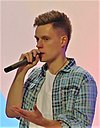
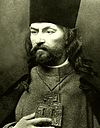

- Eduard Limonov (Savenko) - writer and publicist, founder of National Bolshevik Party
- Vasily Lanovoy, actor who worked in the Vakhtangov Theatre, was also known as the President of Artek Festival of Films for Children
- Pavel Sudoplatov, NKVD officer, lieutenant general of the MVD,who became involved in several famous episodes, including the assassination of Leon Trotsky in 1940, the Soviet espionage program which obtained information about the atomic bomb from the Manhattan Project, and Operation Scherhorn in 1944
- Bogdan Stashinsky, a former KGB officer and spy who assassinated the Ukrainian nationalist leaders Lev Rebet and Stepan Bandera in the late 1950s
- Viktor Medvedchuk - Ukrainian opposition politician.Born in Pochet, Krasnoyarsk Krai, Russian SFSR.Vladimir Putin is the godfather of Medvedchuk's daughter Daryna (born in 2004)
- Sergey Tereshchenko - Prime Minister of Kazakhstan (1991-1994). He was born in ethnic Ukrainian family in the town of Lesozavodsk, which was in the Primorsky Krai Region of the RSFSR
- Innocent of Irkutsk - missionary to Siberia and the first bishop of Irkutsk in Russia
- Joasaph of Belgorod - Russian Orthodox hierarch, bishop of Belgorod from 1748 until his death
- John of Tobolsk - Metropolitan of Tobolsk
- Saint John of Shanghai and San Francisco - prominent Eastern Orthodox ascetic and hierarch of the Russian Orthodox Church Outside Russia (ROCOR) who was active in the mid-20th century
- Arsenius (Matseyevich) - metropolitan of Rostov and Yaroslavl who protested against the confiscation of the church's land by Empress Catherine II in 1764
- Dimitry of Rostov - leading opponent of the Caesaropapist reform of the Russian Orthodox church promoted by Feofan Prokopovich.
- Ivan Zaporozhets - Soviet security officer and official of the OGPU-NKVD who was suspected of being involved in the assassination of Sergei Kirov in Leningrad in December 1934
- Roman Rudenko - Procurator General of the Soviet Union (1953-1981). He is well known internationally for acting as chief prosecutor for the USSR at the 1946 trial of the major Nazi war criminals in Nuremberg.
- Iona Nikitchenko - judge of the Supreme Court of the Soviet Union
- Oleksiy Alchevsky - entrepreneur, philanthropist, and industrialist of the Russian Empire. He was a pioneer in establishing the first finance group in Russia.
- Leonid Fedun - billionaire businessman
- Georgy Gapon, a Russian Orthodox priest and a popular working-class leader before the 1905 Russian Revolution
- Viktor Bout - arms dealer
- Stefan Yavorsky - archbishop and statesman in the Russian Empire and the first president of the Most Holy Synod
- Nina Kukharchuk-Khrushcheva - First Lady of USSR, the second wife of the Soviet leader Nikita Khrushchev
- Raisa Titarenko-Gorbacheva - First Lady of USSR,the wife of Soviet leader Mikhail Gorbachev
- Vera Kholodnaya - the first star of Russian silent cinema
- Yelena Bondarchuk(half Ukrainian), Soviet actress
- Zhanna Prokhorenko, Soviet actress
- Klara Luchko, Soviet actress
- Valeriya Zaklunna - Soviet actress,People's Artist of Russia (22 May 2004)
- Pavel Pavlenko - Soviet stage and film actor.
- Artur Kirilenko - entrepreneur, between 1994 and 2010 was owner and director of Stroymontazh, one of the largest property development companies in St Petersburg, Russia. Honorary Builder of Russia.
- Viktor Pshonka - former Prosecutor General of Ukraine (from 4 November 2010 until 22 February 2014), State Counselor of Justice of Ukraine and member of the High Council of Justice of Ukraine
- Valentin Dikul - circus artist and rehabilitation specialist
- Yuri Shvets - Major in the KGB between 1980 and 1990
- Victor Kostetskiy - Russian and Soviet actor.
- Miroslava Karpovich - actress and model
- Yaroslav Boyko - Russian actor of theatre and cinema.
- Aleksandr Tsekalo - musician, actor, radio and TV host. Founder of production company Sreda.
- Sergey Makovetsky - film and stage actor
- Ivan Koval-Samborsky - Stage and film actor
- Viktor Petrik - businessman,who claims to have made a number of scientific breakthroughs which he markets through his company Goldformula
- Sergei Garmash - Soviet and Russian film and stage actor, People's Artist of Russia
- Sergei Magnitsky - Ukrainian-born Russian tax advisor
- Dositheus (Ivanchenko) - bishop of the Russian Orthodox Church
- Nikita Dzhigurda - movie actor, singer, and cult media icon
- Maryana Spivak - actress
- Aleksei Petrenko - Soviet and Russian film and stage actor
- Petro Prokopovych - founder of commercial beekeeping and the inventor of the first movable frame hive
- Anatoly Savenko - Russian nationalist, social and political activist, lawyer, writer, essayist and journalist.
- Kirill Vyshinsky - journalist
- Alexander Borodai - journalist and entrepreneur, former separatist leader who was Prime Minister of the self-proclaimed Donetsk People's Republic in 2014
- Arkady Babchenko - print and television journalist
- Anatoly Lysenko - Soviet and Russian television figure, journalist, director, producer
- Dmitry Gerasimenko - businessman, ex-owner of steel company Krasny Oktyabr Closed Joint-Stock Company and of basketball clubs BC Krasny Oktyabr and Pallacanestro Cantù.
- Yuriy Kutsenko - actor, producer, singer, poet, and screenwriter
- Vitaly Zakharchenko - Former Minister of Internal Affairs of Ukraine
- Alexander Klimenko - former Ukrainian entrepreneur and politician, former Minister of Revenue and Duties of Ukraine
- Vladimir Ivanenko - founder of the first nongovernmental cable and essential television network in the USSR (1988); initiator and organizer of the first direct satellite broadcast from the territory of the former USSR (1994)
- Viktor Yanukovych, the fourth President of Ukraine
- Lyudmyla Nastenko-Yanukovych, former First Lady of Ukraine
- Viktor Yanukovych Jr, a Ukrainian politician and Member of Parliament



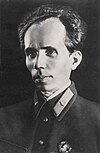



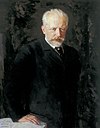


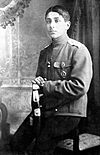


- Yury Dud - sports journalist and YouTuber, was editor-in-chief of Sports.ru from 2011 to 2018 and since 2018, has been Deputy Director-General
Culture
- Pyotr Ilyich Tchaikovsky (quarter Ukrainian) - composer
- Nikolai Gogol – writer
- Nikolai Ostrovsky - socialist realist writer
- Korney Chukovsky - poet
- Yevgeny Yevtushenko - poet
- Anna Akhmatova - poet
- Sergei Bondarchuk – film director
- Natalya Bondarchuk – film director
- Fyodor Bondarchuk – film director
- Alexander Dovzhenko - film director
- Leonid Gaidai – film director
- Anna Politkovskaya - journalist, writer, and human rights activist
- Taras Shevchenko - poet
- Vladimir Korolenko - writer
- Mikhail Zoshchenko - writer
- Vladimir Nemirovich-Danchenko - playwright and theatre administrator, one of the two founders of the Moscow Art Theatre
- Vasily Nemirovich-Danchenko - writer and a journalist
- Sergei Lukyanenko - science fiction and fantasy author
- Konstantin Paustovsky - writer
- Gregory Skovoroda - writer and philosopher
- Anna Netrebko -operatic soprano
- Arkady Averchenko - playwright and satirist
- Larisa Shepitko - film director, screenwriter and actress,considered one of the best female directors of all times
- Grigory Chukhray – Soviet film director
- Pavel Chukhray - Soviet film director
- Konstantin Lopushansky - Soviet and Russian film director, film theorist and author
- Pavel Morozenko — Soviet theatre and film actor
- Yuri Moroz - Soviet and Russian film director, actor, scriptwriter, producer
- David Burliuk - poet and painter, often described as "the father of Russian Futurism"
- Wladimir Burliuk - avant-garde artist, Cubo-futurist
- Theophan Prokopovich- Russian Imperial Orthodox theologian, writer, poet, mathematician, and philosopher
- Dmitry Levitsky - painter
- Vladimir Borovikovsky - painter
- Konstantin Kryzhitsky - landscape painter
- Boris Vladimirski - Soviet painter of the Socialist Realism school.
- Dmitry Bezperchy - painter
- Rufin Sudkovsky - painter
- Vladimir Orlovsky - painter
- Nikolai Pimonenco - painter
- Nikolai Yaroshenko - painter
- Alexander Litovchenko - painter
- Alexander Murashko - painter
- Aleksandr Shevchenko - modernist painter and sculptor
- Sergey Solomko - painter, watercolorist, illustrator and designer
- Vasily Velichko - poet, playwright and publicist
- Ada Chumachenko - poet, playwright and writer
- Ivan Savenko - painter, Honored Artist of the RSFSR
- Nikolay Samokish - painter
- Igor Savitsky - painter, archeologist and collector, especially of avant-garde art
- Grigori Zozulya - artist
- Ippolit Bogdanovich - Russian classicist author of light poetry,
- Yevgeny Grebyonka - romantic prose writer, poet, and philanthropist
- Vasily Kapnist - poet and playwright
- Igor Markevitch - avant-garde composer and conductor
- Yevhen Pluzhnyk - poet
- Vasily Stus - poet
- Igor Savchenko - screenwriter and film director
- Ilia Lagutenko - musician
- Yuri Shevchuk - musician
- Yuri Klimenko - Soviet and Russian cinematographer and photographer
- Nikolai Gubenko - Soviet and Russian actor, film and theatre director, screenwriter, founder of the Community of Taganka Actors theatre.People's Artist of the RSFSR
- Ivan Kozlovsky - lyric tenor, long-time teacher at the Moscow Conservatory
- Bohdan Dedyckiy - writer, poet and journalist
- Maxim Berezovsky - composer
- Grigory Alchevsky - composer
- Michał Czajkowski - writer
- Tomasz Padura - Romantic poet
- Grigory Danilevsky - writer, historical novelist, and Privy Councillor of Russia
- Yuri Klimenko - Soviet and Russian cinematographer and photographer
- Vasily Narezhny - writer known for his satirical depiction of provincial mores in the vein of the 18th-century picaresque novel
- Ruslan Gorobets - music composer, singer and arranger
- Nikolay Shcherbina - poet
- Yury Koval - author, artist, and screenplay writer
- Aleksei Bibik - one of the first working-class novelists
- Valentin Pikul- Soviet historical novelist
- Oleg Kulik - performance artist, sculptor, photographer and curator
- Anatoly Polyanski - architect
- Alexander Vertinsky - artist, poet, singer, composer, cabaret artist and actor
- Panteleimon Kulish - writer, critic, poet, folklorist, and translator
- Yevgeny Titarenko - writer
- Grigory Pasko -military journalist
- Viktor Kosenko - composer, pianist, and educator
- Aleksandr Shevchenko modernist painter and sculptor
- Alexandra Strelchenko - actress and singer, performer of Russian folk songs, Russian romances and pop songs, People's Artist of the RSFSR
- Klavdiya Shulzhenko - Soviet popular female singer and actress
- Alexandra Snezhko-Blotskaya - Soviet animated film director
- Lyudmila Gurchenko - popular Soviet and Russian actress, singer and entertainer. People's Artist of the USSR (1983)
- Viktor Klimenko - singer
- Oleg Karavaychuk - Soviet and Russian composer, author of music for many films and theater performances
- Anastasia Stotskaya - singer
- Arkady Ukupnik - composer, pop singer, actor, and producer
- Bogdan Titomir - musician, rapper and DJ, who began his career in a popular 1990s duo Car-Man
- Sogdiana Fedorinskaya - singer and actress
- Kain Rivers - singer
- Boris Slutsky - poet
- Vitaly Korotich - writer and journalist
- Pamfil Yurkevich - idealist philosopher and teacher.
- Nikolay Gnedich - poet and translator
- Natalia Dudinskaya - prima ballerina who dominated the Kirov Ballet from the 1930s through the 1950s
- Svetlana Loboda - singer and composer.
- Natasha Korolyova (Porivay) - singer
- Vera Brezhneva (Halushka) - singer
- Anastasia Prikhodko - singer, represented Russia in the Eurovision Song Contest 2009 in Moscow
- Regina Todorenko - pop-singer and television presenter,member of the Russian show "Voice"
- Alexander Archipenko - avant-garde artist, sculptor, and graphic artist
- Marian Peretyatkovich - architect
- Natalia Ermolenko-Yuzhina - opera singer (soprano)
- Nicolai Ivanovich Kravchenko - battle painter, journalist and writer
- Pyotr Leshchenko - singer, universally considered to be "the King of Russian Tango"
- Olga Peretyatko - operatic soprano
- Vladimir Bortko – film director
- Igor Krutoy - music composer, performer, producer and musical promoter
- Mikhail Gulko - author and performer of Russian chanson
- Ignaty Potapenko - writer and playwright.
- Vladimir Khotinenko - film director
- Lolita Milyavskaya - singer, actress, TV and film director
- Yolka - singer
- Sergey Dorenko - Russian TV and radio journalist, known for hosting a weekly news commentary program in 1999–2000
- Vera Kamsha - author of high fantasy and a journalist.
- Andrey Kavun - film director and screenwriter
- Roman Viktyuk - theatre director, actor, and screenwriter
Sports

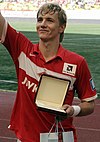


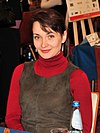


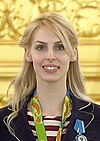



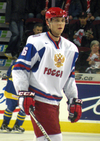




- Vladimir Kramnik - chess grandmaster, the Classical World Chess Champion from 2000 to 2006, and the undisputed World Chess Champion from 2006 to 2007. He has won three team gold medals and three individual medals at Chess Olympiads.
- Lyudmila Rudenko - Soviet chess player and the second women's world chess champion, from 1950 until 1953; was awarded the FIDE titles of International Master (IM) and Woman International Master (WIM) in 1950, and Woman Grandmaster (WGM) in 1976. She was the first woman awarded the International Master title.
- Natalia Titorenko - chess player who hold the FIDE title of Woman International Master (1982)
- Ekaterina Lagno - Russian (since 2014) chess grandmaster, Women's Vice World Champion in 2018, Women's World Rapid Champion in 2014 and Women's World Blitz Champion in 2010, 2018 and 2019.
- Nikolay Davydenko - tennis player
- Vladislav Tretiak - ice hockey goaltender; 3 time Olympic gold medallist; 10 time world champion; considered one of the greatest of all time.
- Alexei Zhitnik - ice hockey defenceman; has played more games in the National Hockey League (NHL) (1,085) than any other Soviet-born defenceman.
- Daniil Sobchenko - ice hockey player; was the member of the Russian national team that competed in the IIHF World Championship's under 18 and under 20 levels; winning gold for the country in 2011.
- Vitaly Anikeyenko - ice hockey player
- Ignat Zemchenko - professional ice hockey player currently playing with HC Yugra in the Supreme Hockey League (VHL)
- Denis Shvidki - former professional ice hockey right wing
- Dmitri Khristich - ice hockey player
- Anton But - former professional ice hockey winger
- Oleg Tverdovsky - ice hockey defenceman
- Vitaly Vishnevskiy - former professional ice hockey defenceman. He previously played in the National Hockey League for the Mighty Ducks of Anaheim, Atlanta Thrashers, Nashville Predators, and New Jersey Devils, as well as for Lokomotiv Yaroslavl, SKA St. Petersburg and Severstal Cherepovets in the KHL.
- Alexander Komaristy - ice hockey centre who plays for HC Dinamo Saint Petersburg in the Supreme Hockey League (VHL)
- Andrei Nikolishin - ice hockey player; Olympic Bronze medal winner
- Anton Babchuk - ice hockey defenceman
- Kostiantyn Kasianchuk - ice hockey player
- Anatoliy Tymoshchuk - football coach and a former midfielder, currently an assistant coach of the Russian Premier League club Zenit Saint Petersburg
- Vladimir Kuts - Soviet long-distance runner, who won the 5000 and 10000 m races at the 1956 Olympics, setting Olympic records in both events
- Ivan Poddubny - professional wrestler from the Russian Empire and later the Soviet Union
- Olga Dvirna - female middle-distance runner who represented the Soviet Union in the late 1970s and early 1980s
- Anton Shvets - footballer who plays for Akhmat Grozny, as a central midfielder, represents the Russia national football team internationally
- Oleg Salenko - soccer player
- Artem Dzyuba - Ukrainian-born Russian soccer player, whose father is Ukrainian.
- Aleksei Miranchuk and Anton Miranchuk - twin Russian soccer players of Ukrainian origin from Kuban.
- Yaroslav Rakitskyi - footballer currently playing as a defender for Russian club Zenit Saint Petersburg
- Vladislav Ternavsky - football coach and former player
- Anatoliy Byshovets -Soviet and Russian football manager and former Soviet international striker
- Sergei Semak - football manager and a former international midfielder who is currently the manager of Zenit St. Petersburg
- Alexey Oleynik - mixed martial artist and combat sambo fighter currently signed with the Ultimate Fighting Championship, competing in their heavyweight division.
- Anna Pogorilaya - figure skater
- Irina Poltoratskaya - Russian team handball player, playing on the Russian women's national handball team.
- Tatyana Navka - former competitive ice dancer
- Olga Sherbak - handball player who plays for HC Lada
- Oksana Grishuk - former competitive ice dancer.
- Elena Riabchuk - former pair skater
- Aleksei Kalashnik — professional football player
- Valentin Moldavsky - Russian (since 2014) combat sambo and mixed martial arts practitioner, World and European Champion in +100 kg.
- Dmitry Pashytsky - volleyball player, member of the Russian club Zenit Saint Petersburg, Estonian Champion (2011), Russian Champion (2019).
- Irina Zhuk - ice dancing coach and a former competitor for the Soviet Union
- Maria Stavitskaia - former competitive figure skater
- Leonid Zhabotynsky - weightlifter who set 19 world records in the superheavyweight class, and won gold medals at the 1964 and 1968 Olympic Games
- Sergei Makarenko - retired Soviet sprint canoeist who competed from late 1950s to early 1960s
- Anatoli Yevtushenko - Honored coach of the USSR (handball)
- Aleksandr Kovalenko - retired USSR triple jumper who won the bronze medal at the 1988 Summer Olympics
- Vladimir Yashchenko - member of the Soviet national team and former world record holder in the high jump (233 cm, 234 cm and 235 cm).
- Tetyana Hlushchenko - former Soviethandball player who competed in the 1976 Summer Olympics
- Tetyana Kozyrenko - footballer, who plays for Lokomotiv Moscow in the Women's Football League
- Nataliya Zinchenko - football player who currently acts as manager for Zvezda Perm
- Artem Klimenko - professional basketball player
- Viktor Vashchenko - former professional footballer
- Iryna Chunykhovska - former sailor, who competed for the Soviet Union
- Larysa Moskalenko - former sailor, who competed for the Soviet Union
- Kostyantyn Parkhomenko - football player who last played for FC Sakhalin Yuzhno-Sakhalinsk
- Igor Gamula - professional football coach and a former player. He works as a scout for FC Rostov. He made his debut in the Soviet Top League in 1978 for FC Zaria Voroshilovgrad.
- Igor Pedan - strongman who is best known for competing in the IFSA Strongman World Championships and World's Strongest Man
- Victor Khryapa - former professional basketball player who last played for CSKA Moscow of the VTB United League
- Ilya Tsymbalar - football player and coach
- Sergei Yuran - professional football manager and a former player. He is the manager of SKA-Khabarovsk.
- Vasil Yakusha - Soviet rower who competed for the Soviet Union in the 1980 Summer Olympics and in the 1988 Summer Olympics.
- Oleksandr Marchenko - Soviet rower. He and his partner,who won the bronze medal for the Soviet Union in the double sculls competition at the 1988 Summer Olympics.
- Aleksandr Sobko - former football player
- Boris Butenko - Soviet athlete,who competed in the men's discus throw at the 1952 Summer Olympics
- Andriy Tishchenko - Soviet former rower who competed for the Soviet Union in the 1980 Summer Olympics
- Igor Kornienko - former professional tennis player
- Bogdan Aleshchenko - former football midfielder.
- Aleksandr Andryushchenko - professional football coach and a former player who currently works as a sports department manager for FC Rostov
- Gennadi Avramenko - Soviet sport shooter
- Volodymyr Herashchenko - Soviet professional football coach and a former player.
- Aleksandr Pavlenko - football official and a former player
- Sergey Kovalenko - Soviet basketball player who won the gold medal with the Soviet basketball team in the 1972 Olympics, played for CSKA Moscow (1976–1980)
- Oleg Stepko - Russian (since March 2018) gymnast
- Olha Huzenko - rower who competed for the Soviet Union in the 1976 Summer Olympics
- Viktor Maryenko - Soviet football player and coach
- Antonina Rudenko - retired Soviet swimmer who won a gold medal in the 4 × 100 m freestyle relay at the 1966 European Aquatics Championships, setting a new European record.
- Aleksandr Pavlenko - football official and a player,who plays as a central midfielder for FC Rodina Moscow
- Vadim Yaroshchuk - former butterfly and medley swimmer from the Soviet Union,who won two bronze medals at the 1988 Summer Olympics in Seoul, South Korea.
- Oleksiy Demyanyuk - high jumper, who set the world's best year performance in 1981 with a leap of 2.33 metres at a meet in Leningrad
- Dmitry Muserskiy - volleyball player, member of the Russia men's national volleyball team, 2012 Olympic Champion, 2013 European Champion, gold medallist of the 2011 World Cup and multiple World League medallist.
- Semyon Poltavskiy - volleyball player, who was a member of the men's national team that won the silver medal in both the 2005 and 2007 European Championships, was named Most Valuable Player in the latter tournament
- Liliya Osadchaya - former Soviet volleyball player,WHO won a silver medal at the 1976 Summer Olympics
- Andrei Karyaka - Russian football coach and a former player who played as a midfielder
- Sergei Mamchur - football defender.
- Viktor Miroshnichenko - boxer, represented the USSR at the 1980 Summer Olympics in Moscow, Soviet Union.
- Oleg Goncharenko - Distinguished Master of Sports of the USSR, was the first male Soviet speed skater to become World Allround Champion.
- Konstantin Yeryomenko - Russian futsal player who was named the greatest futsal player of the 20th century
- Dmitri Shkidchenko - figure skating coach and former pair skater who competed internationally for the Soviet Union.
- Olena Zubko - rower who competed for the Soviet Union in the 1976 Summer Olympics. In 1976 she was a crew member of the Soviet boat which won the silver medal in the eights event
- Viktor Budyansky - retired association footballer who played as a midfielder
- Oleh Leschynskyi - former Soviet professional football midfielder and Ukrainian (until 2014) and Russian (since 2014) coach
- Serhei Nahorny - Soviet sprint canoeist
- Tatiana Volosozhar - pair skater.
- Lesya Makhno - volleyball player, member of the Russian national team that won the gold medal at the 2010 World Championship.
- Yevgeniy Ivchenko - Soviet athlete who competed mainly in the 50 km walk
- Yuri Vlasenko - ice dancer.
- Vasyl Arkhypenko - Soviet athlete who competed mainly in the 400 metre hurdles
- Leonid Tkachenko - former Soviet player and the Ukrainian-Russian coach
- Maksim Tishchenko - Russian professional football coach and a former player
- Georgy Prokopenko - retired Soviet swimmer who competed at the 1960 and 1964 Summer Olympics
- Viktor Vashchenko - former professional footballer
- Vladislav Ignatenko - football player who plays for FC Nosta Novotroitsk
- Valentina Ivakhnenko - professional tennis player
- Serhiy Petrenko - retired sprint canoeist
- Sergey Shavlo - former Soviet footballer
- Aleksandr Shpakovsky - Soviet football player
- Viktor Onopko - football coach
- Andriy Demchenko - football coach and a former midfielder
- Darya Tkachenko - Russian (since 2016) draughts player holding the FMJD titles of FMJD Master (MF) and Women's International Grandmaster (GMIF). She is four-time women's world champion (2005, 2006, 2008, 2011) and twice women's European champion (2004, 2006) in international draughts.
- Anzhelika Shevchenko - Russian (since 2017) runner who specializes in the middle-distance running events
- Konstantin Bakun - Ukrainian volleyball player of Russian citizenship (since 2011), member of the Russia men's national volleyball team, Russian Champion (2020).
- Oleksandr Haydash - Russian (since 2014) professional football striker.
- Denys Holaydo - retired football midfielder
- Igor Dobrovolski - football manager and a former player
- Ilya Stefanovich - football player,plays as forward for FC Volgar Astrakhan
- Aleksey Sokirskiy - Russian(since 2015) hammer thrower.
- Anastasia Shpilevaya - former competitive ice dancer.
- Artyom Bezrodny - Russian association footballer
- Sergey Karetnik - football midfielder
- Andrey Fedoriv - former sprinter from the former Soviet Union, who specialised in the 200 metres
- Ivan Ordets - professional footballer who plays as a defender for Russian club Dynamo Moscow
- Olha Maslivets - windsurfer who has competed at four Olympic Games (2000, 2004, 2008 and 2012)
- Oleksandr Pomazun - former goalkeeper and a Russian football coach,the goalkeepers coach with FC Khimik-Arsenal
- Oleg Goncharenko - Distinguished Master of Sports of the USSR, was the first male Soviet speed skater to become World Allround Champion.
- Yuri Doroshenko - professional football player
- Mykola Musiyenko - former triple jumper who represented the Soviet Union
- Vyacheslav Protsenko - professional football coach and a former player
- Anastasia Shlyakhovaya - female volleyball player
- Yuriy Prokhorenko - former pole vaulter who competed in the 1976 Summer Olympics and in the 1980 Summer Olympics
- Konstantin Yeryomenko - futsal player who was named the greatest futsal player of the 20th century
- Boris Butenko - Soviet athlete.
- Maksim Oberemko - Russian (since 2015) windsurfer
- Yury Starunsky - Soviet volleyball player who competed for the Soviet Union in the 1972 Summer Olympics and in the 1976 Summer Olympics
- Vladislav Zhovnirski - pair skating coach and former competitor.
- Nikolai Latysh - professional football coach, an assistant manager with FC Tobol
- Pavel Moroz - volleyball player, a member of Russia men's national volleyball team and Russian club Fakel Novy Urengoy
- Vera Rebrik - Russian(since 2015) track and field athlete who competes in the javelin throw
- Taras Khtey - volleyball player, a member of Russia men's national volleyball team.
- Aleksandr Bondar - Russian (since 2014) diver
- Tatiana Voitiuk - Soviet former ice dancer
- Serhiy Krasyuk - Soviet former swimmer, who won a gold and silver medal at the 1980 Summer Olympics in the 4 × 100 m medley and 4 × 200 m freestyle relays, respectively
- Anastasia Bliznyuk - group rhythmic gymnast
- Vera Moskalyuk - judoka
- Borys Tereshchuk - Soviet former volleyball player who competed for the Soviet Union in the 1968 Summer Olympics
- Anatoliy Polishchuk - former volleyball player who competed for the Soviet Union in the 1976 Summer Olympics
- Oksana Grishuk - former competitive ice dancer
- Roman Romanchuk - Russian (since 2000) amateur boxer
- Anatoliy Bondarchuk - retired Soviet hammer thrower, who is regarded as the most accomplished hammer throw coach of all time
- Viktor Mikhalchuk - former volleyball player who competed for the Soviet Union in the 1968 Summer Olympics
- Valery Kravchuk - retired Soviet heavyweight weightlifter
- Serhiy Kravchuk - Soviet fencer
- Artur Minchuk - Russian pair skating coach and former competitor.
- Borys Savchuk - Soviet sprinter, who competed in the men's 200 metres at the 1964 Summer Olympics representing the Soviet Union
- Ilya Kovalchuk - ice hockey player.
- Vitaly Mutko - former Minister of Sport of Russia
Science
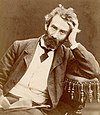




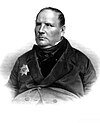

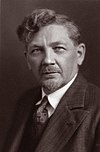

- Nicholas Miklouho-Maclay- explorer, ethnologist, anthropologist and biologist
- Gleb Lozino-Lozinskiy- lead developer of the Soviet Spiral and Shuttle Buran programme.
- Vladimir Vernadsky- mineralogist and geochemist
- George Vernadsky - historian
- Valentin Glushko - rocket scientist, a pioneer in rocket propulsion systems, and a major contributor to Soviet space and defense technology
- Trofim Lysenko- agronomist and biologist
- Theodosius Dobzhansky - geneticist and evolutionary biologist
- Mikhail Ostrogradsky - mathematician
- Anatoly Fomenko - mathematician, well known as a topologist, the author of a pseudoscientific theory known as New Chronology
- Anton Makarenko - one of the founders of Soviet pedagogy
- Vasyl Sukhomlynsky - humanistic educator in the Soviet Union who saw the aim of education in producing a truly humane being
- Yevgeny Zavoisky - Soviet physicist known for discovery of electron paramagnetic resonance in 1944
- Igor Shafarevich - mathematician who contributed to algebraic number theory and algebraic geometry
- Boris Paton - Soviet mechanical scientist and engineer, famous for his works in electric welding
- Stephen Timoshenko - engineer and academician, considered to be the father of modern engineering mechanics
- Viktor Bunyakovsky - mathematician
- Yuri Lysianskyi - explorer
- George Kistiakowsky - physical chemistry professor
- Alexander Kistiakowsky - ornithologist and a specialist on bird lice
- Bogdan Kistyakovski - philosopher and social scientist
- Yuri Denisyuk - Soviet physicist, one of the founders of optical holography. He is known for his great contribution to holography, in particular for the so-called "Denisyuk hologram"
- Valentin Bliznyuk - aircraft designer, Chief Designer of the Tu-160
- Mikhail Kravchuk - mathematician
- Valery Kostuk - Russian scientist who has contributed to the development of processes for producing gases and cryogenic liquids
- Alexander Zasyadko - Russian Imperial gunner and specialist in rocketry
- Praskov′ja Georgievna Parchomenko - Soviet astronomer who discovered many minor planets between the years of 1930–1940
- Valery Glivenko -mathematician
- Igor Simonenko - mathematician
- Sergei Brukhonenko - Soviet physician, biomedical scientist and technologist,his research was vital to the development of open-heart procedures in Russia
- Yuri Nesterenko - mathematician
- Sergei Rudenko - prominent Soviet anthropologist and archaeologist who discovered and excavated the most celebrated of Scythian burials, Pazyryk in Siberia.
- Vladimir Lysenko - Russian academic
- Anatoly Babko - chemist
- Mariya Sergeyenko - Soviet scholar of Roman history and philologist
- Alexander Nikitenko - historian, censor, Professor of Saint Petersburg University, and ordinary member of St. Petersburg Academy of Sciences
- Fyodor Pirotsky - inventor of the world's first railway electrification system and electric tram
- Vladimir Podvysotsky - pathologist, endocrinologist, immunologist and microbiologist
- Alexander Potebnja - linguist and philosopher
- Amvrosy Metlinsky - poet, ethnographer, folklorist and panslavist
- Arkhip Lyulka - Soviet scientist and designer of jet engines, head of the OKB Lyulka, member of the USSR Academy of Sciences
- Nikolai Kibalchich - rocket pioneer
- Nikolai Zarudny - explorer and zoologist who studied the flora and fauna of Central Asia
- Pyotr Zinchenko - developmental psychologist
- Dmitri Ivanenko - theoretical physicist
- Nikolay Burdenko - Soviet surgeon, the founder of Russian neurosurgery
- Vladimir Nemoskalenko - physicist
- Vladimir Martynenko - sociologist, economist, and political scientist; Doctor of political sciences, Professor, Chief Scientific Officer, Institute of Socio-Political Studies under the Russian Academy of Sciences (ISPI RAN).
- Pyotr Yefimenko - ethnographer and historian
- Evgenia Kirichenko - historian of architecture and art
- Antonina Prikhot'ko - experimental physicist
- Konstantin Buteyko, the creator of the Buteyko method for the treatment of asthma and other breathing disorders
- Anatoly Kondratenko - theoretical physicist
- Yuri G. Zdesenko - nuclear physicist known for a significant contribution to investigations of double beta decay
- Vladimir Marchenko - mathematician
- Boris Evgenyevich Votchal - Academician of the USSR Academy of Medical Sciences (since 1969), Honored Scientist of the Russian Federation (1966), one of the founders of the clinical pharmacology in Russia
- Victor Linetsky - petroleum hydrogeologist
- Vasily Omeliansky - microbiologist and author of the first original Russian text book on microbiology
- Yakub Holovatsky - historian
- Nikolay Dikansky - physicist
- Boris Struminsky - physicist known for his contribution to theoretical elementary particle physics
- Vadym Slyusar — founder of tensor-matrix theory of digital antenna arrays (DAAs), N-OFDM and other theories in fields of radar systems, smart antennas for wireless communications and digital beamforming
- Sergiy Vilkomir - computer scientist
- Yuri Kivshar - physist
- Stepan Kozhumyaka - engineer, bridge-builder and linguist
- Klyment Kvitka - musicologist and ethnographer
- Nikolay Gamaleya - Soviet physician and scientist who played a pioneering role in microbiology and vaccine research
- Vladimir Dybo - specialist in comparative historical linguistics and accentology
- Victor Veselago - Soviet physicist, doctor of physical and mathematical sciences
- Alexander Bogomolets - pathophysiologist.
- Boris Grabovsky - one of the pioneers of television, invented the first fully electronic TV set (video transmitting tube and video receiver), which was demonstrated in 1928
- Lev Pisarzhevsky - chemist
- Sergei Winogradsky - microbiologist, ecologist and soil scientist who pioneered the cycle-of-life concept
- Valery Solovei - political scientist, historian, and former head of the Public Relations Department at the Moscow State Institute of International Relations (MGIMO)
- Yuri Linnik - Soviet mathematician active in number theory, probability theory and mathematical statistics
- Vladimir Lipsky - botanist
- Platon Poretsky -noted Russian Imperial astronomer, mathematician, and logician
- Daniil Zabolotny - epidemiologist and the founder of the world's first research department of epidemiology
- Oleksandr Harmash - Soviet scientist in the field of production line methods in construction (construction engineering)
- Fedir Vovk, anthropologist-archaeologist, the curator of the Alexander III Museum in St. Petersburg
- Evgeny Paton - Soviet mechanical scientist and engineer, famous for his works in electric welding
- Vladimir Betz - anatomist and histologist, famous for the discovery of giant pyramidal neurons of primary motor cortex
- Alexander Gorban - physicist and biologist
- Kirill Tolpygo - physicist
- Aleksandr Markevich - zoologist, prolific helminthologist and copepodologist
- Mikhail Maksimovich - professor in plant biology
- Alexander Zaporozhets - Soviet developmental psychologist
- Vladimir Pravdich-Neminsky - physiologist who published the first EEG and the evoked potential of the mammalian brain
- Mikhail Tugan-Baranovsky - economist
- Dmitry Grigorovich - Soviet aircraft designer
- Viktor Sadovnichiy - mathematician, winner of the 1989 USSR State Prize, and since 1992 he has been the rector of Moscow State University
- Osip Bodyansky - Slavist
- Pavel Chubinsky - ethnographer and geographer
- Mikhail Grushevsky- historian
- Anatoly Kashpirovsky - psychotherapist, claimed to be a hypnotist and a psychic healer
Soviet/Russian politics

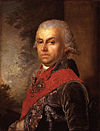
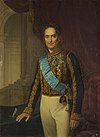

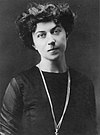

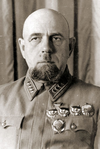

- Alexander Bezborodko - Grand Chancellor of Russian Empire and chief architect of Catherine the Great's foreign policy
- Pyotr Zavadovsky - Russian Imperial statesman
- Dmitry Troshchinsky - senior Cabinet Secretary (1793–98), Prosecutor General (1814–17), Privy Councilor, senator, owner of the serf theater
- Andrey Razumovsky - Russian Imperial diplomat who spent many years of his life in Vienna
- Alexey Razumovsky - Acting Chamberlain (1775), Senator (1776–1807), Minister of Public Education (1810–1816). Active Privy Councillor (1807)
- Viktor Kochubey - Russian statesman and a close aide of Alexander I of Russia
- Pyotr Kapnist -Russian Imperial diplomat and ambassador to Austria (1895-1904)
- Mikhail Rodzianko – chamberlain of the Imperial family, Chairman of the State Duma and one of the leaders of the February Revolution of 1917
- Mikhail Tereshchenko - minister of Foreign Affairs of the Russian Provisional Government (1917)
- Vladimir Antonov-Ovseyenko – Bolshevik leader and diplomat, one of the leaders of the October revolution
- Pavel Dybenko – Bolshevik revolutionary, one of the leaders of the October revolution
- Alexandra Kollontai - revolutionary, politician, diplomat and Marxist theoretician. Serving as the People's Commissar for Welfare in 1917–1918, she was the first woman in history to become an official member of a governing cabinet.
- Nikolai Podvoisky - Bolshevik revolutionary and Soviet statesman, one of the leaders of the October revolution
- Stepan Petrichenko - anarcho-syndicalist politician, de facto leader of the Kronstadt Commune, and the leader of the revolutionary committee which led the Kronstadt rebellion of 1921.
- Dmitry Kursky - Prosecutor General of the Russian SFSR (1922-1928)
- Gleb Bokii - Bolshevik revolutionary, headed the "special department" of the Soviet secret police apparatus, believed to have been in charge of the Soviet Union's concentration camp system.
- Boris Shcherbina, a Soviet politician who served as a vice-chairman of the Council of Ministers from 1984 to 1989.Supervisor of Soviet crisis management during 1986 Chernobyl disaster and the 1988 Armenian earthquake.
- Grigory Petrovsky- Old Bolshevik, participated in signing the Treaty on the Creation of the USSR, one of the officials responsible for implementing Stalin's policies such as collectivization.
- Vsevolod Balitsky - Soviet official, Commissar of State Security 1st Class (equivalent to Four-star General) of the NKVD and a member of the Central Committee of the Communist Party of the Soviet Union
- Yakov Malik - Soviet diplomat,Soviet ambassador to the United Kingdom, well known for giving the USSR justifications for the occupation of Czechoslovakia at the Security Council in August 1968
- Yuriy Kotsiubynsky - Bolshevik politician
- Vasily Shakhrai - political activist and Bolshevik revolutionary during the Russian Revolution,founder of what came to be called National Communism
- Dmitry Polyansky - Soviet-Russian statesman who was First Deputy Chairman of the Council of Ministers of the Soviet Union from 1965 to 1973. From 1958 to 1962 he was Chairman of the Council of Ministers of the Russian SFSR, equivalent to a Premier in of one of the 15 Soviet Socialist Republics that comprised the Soviet Union.
- Vladimir Matskevich - Deputy Chairman of the Soviet Council of Ministers;the Ambassador of the Soviet Union to Czechoslovakia
- Alexander Zasyadko - Soviet economic, state and party leader
- Semyon Sereda - Peoples's Commissar for Agriculture of Soviet Russia
- Alexander Tsiurupa - Bolshevik leader, Soviet statesman, Vice Chairman and, later, Chief of food of Soviet Russia
- Vasyl' Shakhrai - Bolshevik revolutionary
- Nikolai Podgorny, Chairman of the Presidium of the Supreme Soviet of the USSR (1965–1977)
- Zinovie Serdiuk, Deputy of the Supreme Soviet of the USSR, First Secretary of the Moldavian Communist Party
- Alexander Danieliuk-Stefanski - member of the Russian Social Democratic Labor Party
- Pyotr Shelest, Deputy Chairman of the Council of Ministers of the Soviet Union, Full member of the 22nd, 23rd, 24th Politburo.
- Alexei Kirichenko - Second Secretary of the Communist Party of the Soviet Union (17 December 1957 – 5 April 1960)
- Vladimir Ivashko - Soviet politician, briefly acting as General Secretary of the Communist Party of the Soviet Union. Deputy General Secretary of the Communist Party of the Soviet Union (1990-1991)
- Nikolai Demchenko - the first deputy commissar of agriculture of the USSR, People's Commissar of Grain and Livestock Farms of the USSR
- Stepan Chervonenko - Soviet ambassador to Peking
- Igor Gouzenko - cipher clerk for the Soviet embassy to Canada in Ottawa, Ontario
- Grigory Grinko – finance minister of the Soviet Union (1930-1937)
- Vlas Chubar – finance minister of the Soviet Union (1937-1938)
- Ivan Kazanets - the minister of ferrous metallurgy of the Soviet Union
- Vsevolod Murakhovsky - First Deputy Premier of the Soviet Union during the Gorbachev Era
- Vitaly Fedorchuk – KGB officer and Minister of Interior Affairs of the Soviet Union
- Nikolai Golushko – KGB officer and the director of the Federal Service of Counter-intelligence of the Russian Federation
- Ivan Savchenko - Soviet Communist Party and KGB executive
- Stepan Chervonenko - Soviet ambassador to Peking
- Alexey Kazannik - Prosecutor General of Russia (1993-1994)
- Vladimir Chub - the governor of Rostov Oblast in Russia from 1991 until 2010
- Vitaly Mukha - politician, who served as the 1st and third Governor of Novosibirsk Oblast from 1991 to 1993 and from 1995 to 2000
- Sergey Kiriyenko (half Ukrainian) – Prime Minister of Russia
- Aleksandr Skorobogatko - billionaire businessman and former deputy member in the State Duma, having represented the Liberal Democratic Party of Russia (2003-2007) and United Russia (2007-2016)
- Georgy Poltavchenko - Former Governor of Saint Petersburg
- Viktor Khristenko - politician who was chairman of the board of the Eurasian Economic Commission (2012-2016);First Deputy Prime Minister of Russia (1999-2000);Minister of Industry (2004-2012)
- Dmitry Kozak, the Deputy Prime Minister of Russia from 2008 to 2020, Deputy Kremlin Chief of Staff
- Alexander Novak - Deputy Prime Minister of Russia since 2020
- Sergey Kislyak – Russia's Ambassador to the United States (2008–2017)
- Sergey Shakhray - co-author of the Constitution of the Russian Federation
- Irina Yarovaya - Deputy Chairman of the State Duma from United Russia Party and a member of United Russia's General Council
- Anatoly Brovko - Russian politician who served as the Governor of Volgograd Oblast
- Vladimir Timoshenko - career diplomat and is a former ambassador of the Russian Federation to Benin
- Alexei Didenko - politician, deputy of the Tomsk Oblast Duma
- Alexander Prokopchuk - employee of the internal affairs agencies, head of the Ministry of Internal Affairs of the Russian Federation National Central Bureau of Interpol from 14 June 2011, and Vice-President of Interpol from 10 November 2016
- Vladimir Medinsky – Russia's Minister of Culture (2012–present)
- Alexei Navalny (half Ukrainian) – Russia's main opposition leader
- Aleksey Lebed - elected chairman of the government of Khakassia
- Valentina Matviyenko – Chairman of the Federation Council (2011–present)
Minister of Health of Soviet Union
- Nikolai Semashko – Russian politician, organizer of the health system
Military figures
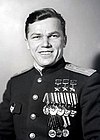




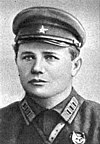

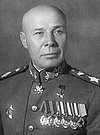


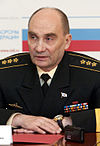
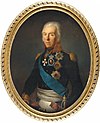


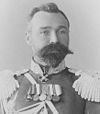

- Petro Doroshenko - Hetman of Right-Bank Ukraine(1665-1672) and a Russian voevoda
- Alexander Lebed – late Lieutenant General of Russia, 1996 Presidential candidate (Ukrainian origin)
- Alexei Razumovsky – Field marshal of Russian Imperial Army
- Kirill Razumovski – Field marshal of Russian Imperial Army
- Ivan Paskevich - Imperial Russian military leader
- Nikolai Linevich - career military officer, General of Infantry (1903) and Adjutant general in the Imperial Russian Army in the Far East during the latter part of the Russo-Japanese War.
- Yuri Lysianskyi - officer in the Imperial Russian Navy and explorer
- Ivan Gudovich - Russian noble and military leader
- Vasily Zavoyko - an admiral in the Russian Imperial navy. In 1854, during the Crimean War, he led the successful defence against the Siege of Petropavlovsk by the allied British-French troops.
- Roman Kondratenko- general in the Imperial Russian Army famous for his devout defense of Port Arthur during the Russo-Japanese War of 1904–1905
- Alexey Schastny - Russian naval commander during World War I
- Ivan Kozhedub - Soviet World War II fighter ace, considered to be the highest-scoring Soviet and Allied fighter pilot of World War II
- Pavel Rybalko - commander of armoured troops in the Red Army during and following World War II
- Alexei Berest - Soviet political officer and one of the three Red Army soldiers who hoisted the Victory Banner
- Fedor Zinchenko - Soviet officer who commanded the 150th Rifle Division's 756th Regiment during the Storming of the Reichstag.
- Dmitry Lavrinenko - Soviet tank commander and Hero of the Soviet Union. He was the highest scoring tank ace of the Allies during World War II.
- Alexander Marinesko – Soviet naval officer and, during World War II, the captain of the submarine S-13 which sank the German military transport ship Wilhelm Gustloff. The most successful Soviet submarine commander in terms of gross register tonnage (GRT) sunk.
- Dmitry Lelyushenko, Soviet military commander, his final actions in 1945 involved directing forces during the Red Army's attacks on both Berlin and Prague.
- Kuzma Derevyanko - general of the Red Army. He was the representative of the Soviet Union at the ceremonial signing of the written agreement that established the armistice ending the Pacific War, and with it World War II
- Semyon Timoshenko – Marshal of the Soviet Union
- Andrey Yeryomenko - Soviet general during World War II and, subsequently, a Marshal of the Soviet Union
- Panteleimon Ponomarenko - a Soviet statesman and politician and one of the leaders of Soviet partisan resistance during WW2
- Fedir Dyachenko - Soviet sniper during World War II, credited with as many as 425 kills.
- Kirill Moskalenko, marshal of the Soviet Union
- Ivan Taranenko - Soviet fighter pilot, flying ace, and regimental commander in World War II who went on to become a general
- Nikolai Semeyko - Soviet Il-2 pilot and navigator during World War II who was twice awarded the title Hero of the Soviet Union
- Sergei Rudenko (general) - Soviet Marshal of the aviation
- Filipp Gorelenko - Soviet Army lieutenant general and a Hero of the Soviet Union
- Nikolai Rybko - decorated and test pilot and lead engineer of the Gromov
- Grigory Kulik, marshal of the Soviet Union
- Pyotr Koshevoy, Soviet military commander and a Marshal of the Soviet Union
- Alexei Radzievsky - professional soldier of the Soviet Union who fought in the Second World War, commanding the 2nd Guards Tank Army during the Lublin–Brest Offensive and afterwards
- Pavel Batitsky - Soviet military leader awarded the highest honorary title of Hero of the Soviet Union in 1965 and promoted to Marshal of the Soviet Union in 1968
- Pyotr Gnido - Soviet fighter pilot during World War II who was credited with 34 solo and 6 shared aerial victories, and recipient of the title of Hero of Soviet Union
- Nikolay Dyatlenko - Soviet officer, interrogator and translator who was part of a team that attempted to deliver a message of truce (sometimes referred to as an "ultimatum") to the German Sixth Army at the Battle of Stalingrad in January 1943
- Maxim Grabovenko - Red Army senior sergeant and Hero of the Soviet Union
- Grigory Kravchenko - test pilot who became a flying ace and twice Hero of the Soviet Union in Asia before the start of Operation Barbarossa
- Ivan Yakovlevich Kravchenko - Red Army major and a Hero of the Soviet Union
- Andrey Kravchenko (general) - commander of multiple tank units of the Red Army throughout World War II who was twice awarded the title Hero of the Soviet Union
- Ivan Kharchenko - Soviet Army Military engineering Colonel and Hero of the Soviet Union
- Ivan Lazarenko - Red Army major general and a posthumous Hero of the Soviet Union
- Nikita Lebedenko - Soviet Army lieutenant general and a Hero of the Soviet Union
- Nikolai Lyashchenko - Soviet Army general
- Sergei Trofimenko - Soviet military commander, active in the Russian Civil War and Second World War.
- Irina Levchenko - medic turned tank officer in the Red Army during World War II who was awarded the title Hero of the Soviet Union in 1965; she was also the first Soviet woman awarded the Florence Nightingale Medal.
- Ivan Golubets - Soviet sailor with the Black Sea Fleet
- Vladimir Sudets - Soviet air commander during World War II, commanding the 17th Air Army, and later became Marshal of the aviation after the war
- Pavel Taran - Il-4 pilot who was twice awarded the title Hero of the Soviet Union during World War II.
- Pyotr Vershigora - one of the leaders of the Soviet partisan movement in Ukraine, Belarus and Poland
- Grigory Kabakovsky - Red Army lieutenant and Hero of the Soviet Union
- Mikhail Tsiselsky - Soviet naval pilot during World War II who was awarded the title Hero of the Soviet Union
- Grigory Tkhor - Soviet aviator, Spanish Civil War and Second Sino-Japanese War volunteer, and major general of the Soviet Air Force
- Mikhail Linnik - Soviet Army captain and Hero of the Soviet Union
- Ivan Turkenich - Soviet partisan, one of the leaders of the underground anti-Nazi organization Young Guard, which operated in Krasnodon district during World War II between 1941 and 1944
- Dmitry Loza - Red Army Colonel and Hero of the Soviet Union
- Spartak Makovsky - Soviet fighter pilot and Hero of the Soviet Union.
- Alexander Luchinsky - Army General of the Soviet Army and a Hero of the Soviet Union
- Arkady Kovachevich - Soviet flying ace and regimental commander during World War II who went on to become a general-lieutenant
- Semyon Kozak - Soviet Army lieutenant general who was twice awarded the title Hero of the Soviet Union for his command of a division during World War II
- Lyudmila Kravets - medic in the 63rd Guards Rifle Regiment during World War II
- Mariya Shcherbachenko - medic in the Red Army during World War II, referred to by the Soviets as the Great Patriotic War
- Ivan Sidorenko - Red Army officer and a Hero of the Soviet Union, who served during World War II
- Dmitry Glinka (aviator) - Soviet flying ace during World War II who was twice awarded the title Hero of the Soviet Union for his achievements, having scored 50 individual aerial victories by the end of the war.
- Boris Glinka - Soviet flying ace during World War II with over 20 solo shootdowns
- Andrei Girich - Soviet Air Force major general and Hero of the Soviet Union
- Vasily Mykhlik - Ilyushin Il-2 pilot and squadron commander in the 566th Assault Aviation Regiment of the Soviet Air Forces during the Second World War who was twice awarded the title Hero of the Soviet Union.
- Leonid Beda - ground-attack squadron commander in the Soviet Air Forces during the Second World War who went on to become a Lieutenant-General of Aviation
- Nikolai Simoniak - General in the Soviet Army during World War II
- Ivan Babak - Soviet Air Forces captain, flying ace, and a Hero of the Soviet Union.
- Oleg Babak - MVD Lieutenant and posthumous Hero of the Soviet Union
- Grigory Skiruta - lieutenant colonel of the Red Army during the Second World War
- Ivan Boyko - commander of the 69th Guards Tank Regiment and later the 64th Guards Tank Brigade during World War II
- Mikhail Denisenko - Red Army Major general and Hero of the Soviet Union
- Ivan Stepanenko - Soviet pilot who became a flying ace with over 30 solo shootdowns during World War II
- Pyotr Braiko - Soviet soldier during the Second World War who gained the status of Hero of the Soviet Union following the conflict
- Nikolai Onoprienko - Red Army colonel and World War II Hero of the Soviet Union
- Ivan Naumovich Dubovoy - Soviet army commander. He fought for the Imperial Russian Army in World War I before going over to the Bolsheviks in the subsequent Civil War
- Stepan Suprun - Soviet test pilot who tested over 140 aircraft types during his career
- Ivan Fedko - Soviet Komandarm 1st rank and army commander. He fought in the Imperial Russian Army during World War I before joining the Bolsheviks. During the Russian Civil War, he fought against the White movement army of Abram Dragomirov in Kiev.
- Maria Nikiforova - anarchist partisan leader during Russian Civil War
- Grigory Vakulenchuk - Sailor, organizer, and leader of the uprising on the Russian battleship Potemkin in 1905
- Afanasi Matushenko - Sailor, revolutionary socialist, and ringleader of the mutiny on the Russian battleship Potemkin
- Leonid Petrovsky - Soviet lieutenant general.
- Ivan Dubovoy - Soviet Army major general of tank forces
- Kornei Andrusenko - Red Army colonel and a Hero of the Soviet Union.
- Yakov Fedorenko, a Soviet marshal and commander during World War II
- Fedir Babachenko - Junior Lieutenant and chief of intelligence in the 323rd Artillery Regiment of the 123rd Infantry Division in the 7th Army on the Northwestern Front during the Winter War
- Aleksandra Samusenko - Soviet T-34 tank commander and a liaison officer during World War II
- Mariya Borovichenko - Soviet medical officer of the Soviet 32nd Guards Artillery Regiment during World War II
- Vera Belik - flight navigator and lieutenant in the 46th Taman Guards Night Bomber Aviation Regiment
- Mariya Kislyak - Soviet partisan during World War II
- Yelena Ubiyvovk - partisan and leader of a Komsomol cell during the Second World War
- Mariya Dolina (Ukrainian: Марія Іванівна Доліна, Russian: Мария Ивановна Долина; 18 December 1922 – 3 March 2010) was a Pe-2 pilot and deputy squadron commander in the women's 125th “Marina M. Raskova” Borisov Guards Bomber Regiment
- Tatyana Marinenko - Soviet partisan and intelligence officer of the NKVD during the Second World War
- Nina Ulyanenko - navigator, pilot and flight commander in the women's 46th Taman Guards Night Bomber Aviation Regiment during World War II, after which she was awarded the title Hero of the Soviet Union on 18 August 1945
- Nikolai Onoprienko - Red Army colonel and World War II Hero of the Soviet Union
- Nikolai Usenko - Red Army man and Hero of the Soviet Union
- Ilya Vlasenko - political commissar in the Red Army during and following World War II
- Pavel Antseborenko (Russian: Павел Афанасьевич Анцеборенко; Ukrainian: Павел Афанасьевич Анцеборенко; 1925 - 20 August 1944) was a Soviet soldier who was awarded the title of Hero of the Soviet Union posthumously in 1944 when he was killed during the defense of a village in modern-day Estonia during Operation Bagration
- Stepan Artyomenko - commander of a battalion of the 447th Rifle Regiment in the Red Army during the Second World War, who was twice awarded the title Hero of the Soviet Union
- Vladimir Sergeyevich Vysotsky - Russian admiral and Commander of the Russian Northern Fleet
- Sergey Mostovoy - Red Army man and Hero of the Soviet Union.
- Pyotr Borovsky - Russian and Soviet surgeon and public health administrator of who worked in Tashkent, professor of surgery in Tashkent Medical Institute
- Mykola Melnyk - Soviet pilot and liquidator hero renowned for his high-risk helicopter mission on the dangerously-radioactive Chernobyl Nuclear Power Plant building immediately after the 1986 Chernobyl disaster
- Mikhail Kirponos - Soviet general of the Red Army during World War II.
- Yevdokiya Nosal - junior lieutenant and deputy squadron commander in the 588th Night Bomber Regiment (nicknamed the "Night Witches" by the Germans) during World War II
- Aleksey Mazurenko - commander of the 7th Guards Assault Aviation Regiment in the Black Sea Fleet during World War II
- Dmitry Onuprienko - Soviet Army lieutenant general and Hero of the Soviet Union
- Ivan Mikhailichenko - Il-2 pilot in the Soviet Air Forces during the Second World War who was twice awarded the title Hero of the Soviet Union
- Alexander Mironenko -Soviet airborne senior sergeant and posthumous Hero of the Soviet Union
- Alexander Molodchy - Soviet long-range pilot who flew over 300 missions on the B-25, Il-4, and Yer-2 during World War II
- Stepan Naumenko - Soviet MiG-15 pilot during the Korean War, credited as the first Soviet ace in the conflict
- Grigory Ges - Soviet Air Force officer who became a flying ace during the Korean War
- Konstantin Olshansky - Senior Lieutenant and Soviet marine of the Black Sea Fleet
- Nikolai Dokashenko - Soviet fighter pilot who was credited as a flying ace in the Korean War with nine shootdowns
- Polina Osipenko - Soviet military pilot during World War II
- Alexander Osipenko (pilot) - Soviet military aviator and, according to some accounts, the Red Air Force's top ace in the Spanish Civil War.
- Zakhar Slyusarenko - tank officer who rose from battalion commander to brigade commander during World War II and was twice awarded the title Hero of the Soviet Union
- Anatoly Petrakovsky - Soviet Army major general and Hero of the Soviet Union
- Volodymyr Pravyk - Soviet firefighter notable for his role in directing initial efforts to extinguish fires following the Chernobyl Disaster
- Georgy Zozulya - ground-attack pilot in the Soviet Air Force during World War II.
- Alexey Perelet - Soviet pilot who was the principal test pilot for military aircraft prototypes produced by Tupolev during World War II
- Mikhail Panikakha - Red Army soldier
- Fyodor Ostashenko - Soviet Army lieutenant general and a Hero of the Soviet Union
- Anatoly Nedbaylo - Il-2 pilot in the 75th Guards Assault Aviation Regiment of the Soviet Air Forces during the Second World War who was twice awarded the title Hero of the Soviet Union
- Andrey Vitruk - Soviet military officer, a Major General of the Soviet Air Forces
- Nikolai Yegipko - officer of the Soviet Navy and a Hero of the Soviet Union
- Yekaterina Zelenko - Soviet Su-2 pilot who flew during the Winter War and World War II
- Yevgeniya Zhigulenko - pilot and navigator in the 46th Taman Guards Night Bomber Aviation Regiment of the Soviet Air Forces during World War II who was awarded the title Hero of the Soviet Union
- Yevdokiya Pasko - Squadron navigator in the Soviet all-female 46th Taman Guards Night Bomber Aviation Regiment during WW2,
- Vasily Senko - Soviet Air Force colonel and the only navigator who was twice awarded the title Hero of the Soviet Union
- Filipp Zhmachenko - Soviet Army colonel general and Hero of the Soviet Union
- Sergei Kramarenko - Soviet Air Force officer. He achieved several high command positions in the USSR and was also an Air Force advisor in Iraq and Algeria in the 1970s. He was the last living Soviet flying ace of Korean War
- Ivan Drachenko - Soviet Il-2 pilot and the only aviator awarded both the title Hero of the Soviet Union and been a full bearer of the Order of Glory.
- Mikhail Bondarenko - navigator and squadron commander in the 198th Assault Aviation Regiment of the Soviet Air Forces during the Second World War who was twice awarded the title Hero of the Soviet Union for his ground-attack sorties on the Il-2 during the war
- Mikhail Ivanovich Bondarenko - artillerist of the Soviet Army during the Great Patriotic War, Hero of the Soviet Union (posthumously)
- Mikhail Grigoryevich Bondarenko - captain-lieutenant in Soviet Navy during the Great Patriotic War who was awarded the title Hero of the Soviet Union for his actions in the Kerch-Eltigen operation
- Galina Dzhunkovskaya - squadron navigator in 125th Guards Dive Bomber Regiment during the Second World War who was honored with the title Hero of the Soviet Union on 18 August 1945.
- Mariya Oktyabrskaya - Soviet tank driver and mechanic who fought on the Eastern Front against Nazi Germany during World War II.
- Konstantin Kobets - Russian army general. In early 1991 he was serving as Deputy Chief of the Soviet General Staff for communications.
- Fyodor Zozulya - admiral of the Soviet Navy
- Pyotr Bochek - junior lieutenant of the Soviet Army during World War II and a Hero of the Soviet Union
- Yury Baluyevsky - the former First Deputy Minister of Defense and Chief of the General Staff of the Armed Forces of the Russian Federation, positions he held from July 2004 to 2007.
- Sergey Sheyko - Hero of the Russian Federation, is a colonel in Russian Naval Infantry
- Gordey Levchenko - Soviet naval commander and admiral from 1944.
- Oleg Ostapenko, the former director of Roscosmos, the federal space agency, retired Colonel General in the Russian Military, former Deputy Minister of Defence, and former commander of the Aerospace Defence Forces
- Aleksandr Golovko - Russian colonel general in the Russian military and commander of the Russian Space Forces since 1 August 2015.
Minister of Defence of Soviet Union

- Rodion Malinovsky - (1957–1967)
- Andrei Grechko - (1967–76)
Head of State of the USSR
- Leonid Brezhnev
- Konstantin Chernenko - (1984–85, half Ukrainian)
- Mikhail Gorbachev (half Ukrainian)
See also
- Demographics of Russia
- Ukrainian diaspora
- Russians in Ukraine
- Ukrainians in Siberia
References
Footnotes
- ^ Asian Russia statistics are excluding the Caucasus.
- ^ Всероссийская перепись населения 2010 г.: Национальный состав населения Российской Федерации [Russian Population Census 2010: National composition of the population of the Russian Federation]. Russian Federal Service of State Statistics (in Russian). Demoscope.ru. 21 March 2013. Archived from the original on 30 May 2012. Retrieved 3 June 2016.
- ^ Arena - Atlas of Religions and Nationalities in Russia. Sreda.org
- ^ "Арена в PDF : Некоммерческая Исследовательская Служба "Среда"". Sreda.org. Retrieved 20 April 2014.
- ^ "MPC Migration Profile: Ukraine" (PDF). European University institute, Migration Policy Centre. June 2013. Retrieved 27 September 2016.
- ^ Mukomel, Vladimir (4 May 2017). "Migration of Ukrainians to Russia in 2014–2015". E-International Relations. Retrieved 14 April 2020.
- ^ Jump up to: a b "Ukraine: UNHCR Operational Update, 01 - 30 November 2017". ReliefWeb. Retrieved 1 February 2018.
- ^ Val, Парк ГорькогоAddress: Moscow Krymsky. "Andreevsky Monastery". Gorky Park. Retrieved 9 August 2021.
- ^ Jump up to: a b Kagramanov, Yuri (2006). Война языков на Украине [The War of Languages in Ukraine]. Novy Mir. magazines.russ.ru (8). Retrieved 27 September 2016.
- ^ Jump up to: a b Kubiyovych (ed) Entsyklopedia Ukrainoznavstva Vol.7, p.2597
- ^ 1897 Census on Demoscope.ru Retrieved Archived 28 May 2012 at the Wayback Machine on 20 May 2007.
- ^ Kulchitskyi, Stanislav (26 January 2006). Імперія та ми [The Empire and We]. Den (in Ukrainian). day.kyiv.ua (9). Retrieved 19 March 2007.
- ^ "Nearly 3.5 million Ukrainians work in Russia". unian.info. 25 February 2009. Archived from the original on 27 February 2014. Retrieved 28 September 2016.
- ^ Yelchenko wants Ukrainian secondary school to operate in Moscow, Kyiv Post (19 August 2010)
- ^ Düvell, Franck (2007). "Research Resources Report 1/3: Country Profile: Ukraine – Europe's Mexico?" (PDF). Centre on Migration Policy and Society, School of Anthropology, University of Oxford. Archived from the original (PDF) on 24 December 2014.
- ^ Jump up to: a b "Why ethnopolitics doesn't work in Ukraine". al-Jazeera. 9 April 2019.
- ^ Russia's Ukrainian minority under pressure, Al Jazeera English (25 April 2014)
A ghost of World War II history haunts Ukraine's standoff with Russia, Washington Post (25 March 2014) - ^ Walker, Shaun (25 August 2015). "Russian court jails Ukrainian film-maker for 20 years over terror offences". The Guardian. ISSN 0261-3077. Retrieved 29 July 2019.
- ^ Jump up to: a b "Disappearing books: How Russia is shuttering its Ukrainian library". Reuters. 15 March 2017. Retrieved 29 July 2019.
- ^ Jump up to: a b Weir, Fred (1 December 2015). "Ukrainian refugees in Russia: Did Moscow fumble a valuable resource?". The Christian Science Monitor. Retrieved 3 June 2016.
- ^ "Ukrainian refugees in Russian Federation". Civic Assistance Committee. 7 October 2014. Retrieved 20 January 2021.
- ^ Fitzpatrick, Catherine A. (4 July 2014). "Russia This Week: How Many Refugees Are There from Ukraine?". The Interpreter. Retrieved 20 January 2021.
- ^ "The Russian Federation, November 2017" (PDF). United Nations High Commissioner for Refugees (UNHCR factsheet). 2017. Retrieved 20 January 2021.
- ^ Malinkin, Mary Elizabeth; Nigmatullina, Liliya (4 February 2015). "The Great Exodus: Ukraine's Refugees Flee to Russia". The National Interest. Retrieved 3 June 2016.
- ^ Открытое письмо Комиссару национальных меньшинств ОБСЕ господину Максу Ван дер Стулу [Open letter to the Commissioner for National Minorities for the OSCE, Mr. Max van der Stoel] (in Russian). Ukrainians of Russia - Kobza. 30 September 2000. Archived from the original on 27 September 2007. Retrieved 20 November 2007: Open letter to the OSCE from the Union of Ukrainians in the Urals.CS1 maint: postscript (link)
- ^ Гарантуйте нам в Росії життя та здоров'я! [Guarantee us life and health in Russia!] (in Ukrainian). Ukrainians of Russia - Kobza. 31 December 2006. Archived from the original on 21 March 2008. Retrieved 20 November 2007: Letter to President Putin from the Union of Ukrainians in Bashkiria.CS1 maint: postscript (link)
- ^ Nalyvaichenko, Valentyn (26 January 2011). "Nalyvaichenko to OSCE: Rights of Ukrainians in Russia systematically violated". KyivPost. Archived from the original on 14 September 2011.
- ^ Lozynskyj, Askold S. (30 January 2002). "The Ukrainian World Congress regarding the census in Russia". Ukrainians of Russia – Kobza. Archived from the original on 2 December 2007.
- ^ "The first Catholic church in Russia built in the Byzantine style has been blessed". ugcc.org.ua. 24 October 2007. Archived from the original on 22 December 2007.
- ^ Demoscope.ru, 1897 census results for the Kuban Oblast Archived 28 May 2012 at the Wayback Machine
- ^ Jump up to: a b c The politics of identity in a Russian borderland province: the Kuban neo-Cossack movement, 1989-1996, by Georgi M. Derluguian and Serge Cipko; Europe-Asia Studies; December 1997 URL
- ^ Ukraine and Ukrainians Throughout the World, edited by A.L. Pawliczko, University of Toronto Press, 1994. ISBN 0-8020-0595-0
- ^ Shambarov, Valery (2007). Kazachestvo Istoriya Volnoy Rusi. Algoritm Expo, Moscow. ISBN 978-5-699-20121-1.
- ^ Kuban Okrug from the 1926 census demoscope.ru
- ^ Zakharchenko, Viktor (1997). Народные песни Кубани [Folk songs of the Kuban]. geocities.com (in Russian). Archived from the original on 11 February 2002. Retrieved 7 November 2007.
- ^ Kaiser, Robert (1994). The Geography of Nationalism in Russia and the USSR. Princeton University Press, New Jersey. ISBN 0-691-03254-8.
- ^ Demoscope.ru Soviet Census of 1989, population distribution in region by region of birth.Retrieved 13 November 2007
- ^ "Russian census 2002". Retrieved 22 April 2007.
- ^ Trylenko, Larysa (29 December 1991). "The coup: Ukrainians on the barricades". The Ukrainian Weekly. ukrweekly.com. LIX (52). Archived from the original on 20 May 2006.
- ^ Всероссийская перепись населения 2002 года - Москва [National Population Census 2002 - Moscow] (in Russian). Demoscope.ru. 19 September 2016. Retrieved 27 September 2016.
- ^ "Kyiv-appointed head of Ukrainian Cultural Center in Moscow intimidated by Russian personnel". Unian.info. 21 September 2016. Retrieved 27 September 2016.
- ^ Kraliuk, Petro (7 July 2009). "Mazepa's many faces: constructive, tragic, tragicomic". The Day. Retrieved 27 September 2016.
- ^ Всероссийская перепись населения 2002 года - Санкт Петербург [National Population Census 2002 - St. Petersburg] (in Russian). Demoscope.ru. 19 September 2016. Retrieved 27 September 2016.
- ^ Всероссийская перепись населения 2002 года - Приморский край [National Population Census 2002 - Primorsky Krai] (in Russian). Demoscope.ru. 19 September 2016. Retrieved 27 September 2016.
- ^ Всероссийская перепись населения 2002 года: Приморский край [Russian Population Census 2002: Primorsky Krai] (in Russian). Demoscope.ru. 2002. Retrieved 3 June 2016.
- ^ Zhelty Klin website
- ^ Таблица 22. Украинцы в структуре населения регионов России (численность и удельный вес), переписи 1897-2010 гг. / Завьялов А. В. Социальная адаптация украинских иммигрантов : монография / А. В. Завьялов. – Иркутск : Изд-во ИГУ, 2017. – 179 с. (Russian)
- ^ Национальный состав населения Российской Федерации 2010 г. [National composition of the population of the Russian Federation in 2010]. Russian Federation - Federal State Statistics Service (in Russian). Retrieved 3 June 2016.
- ^ Украинцы в России: еще братья, но уже гости - О "средне-потолочной" гипотезе про 4 миллиона "заробітчан" в РФ и бесславном конце "Родной Украины" [Ukrainians in Russia: still brothers, but now guests - On the "medium ceiling" hypothesis on 4 million "(Ukrainian) workers" in the RF and the inglorious end of "Mother Ukraine"] (in Russian). Ukrainians of Russia – Kobza. 18 June 2006. Archived from the original on 10 November 2007.
Sources
- Kubiyovych, Volodymyr. Entsykolpedia Ukrainoznavstva. 7.
- Українське козацтво - Енциклопедія - Kyiv, 2006
- Zaremba, S. (1993). From the national-cultural life of Ukrainians in the Kuban (1920 and 1930s). Kyivska starovyna. pp. 94–104.
- Lanovyk, B.; et al. (1999). Ukrainian Emigration: from the past to the present. Ternopil.
- Petrenko, Y. (1993). Ukrainian cossackdom. Kyivska starovyna. pp. 114–119.
- Польовий Р. Кубанська Україна К. Дiокор 2003.
- Ratuliak, V. (1996). Notes from the history of Kuban from historic times until 1920. Krasnodar.
- Сергійчук В. Українізація Росії К. 2000
- Internet site for Ukrainians in Russia
- Зав'ялов А. В. Соціальна адаптація українських іммігрантів : монографія / А. В. Зав'ялов. — Київ : Саміт-книга, 2020. — 180 с.
- Завьялов А. В. Социальная адаптация украинских иммигрантов : монография / А. В. Завьялов. – Иркутск : Изд-во ИГУ, 2017. – 179 с.
External links
- Races of Europe 1942-1943 (in English)
- Hammond's Racial map of Europe 1923 (in English)
- Peoples of Europe / Die Voelker Europas 1914 (in German)
- Ethnographic map of Europe 1914 (in English)
- Ukrainians of Russia by number, sex and share in the population structure, 1926-2010 censuses (in Russian)
- Ukrainian language knowledge in Russia by ethnic groups (in Russian)
- Ukrainians of Russia by their native language, 2010 (in Russian)
- Ukrainians of Russia by languages knowledge, 2002, 2010 (in Russian)
- Distribution of the Ukrainian population of Russia by age and sex, 2010 (in Russian)
- Завьялов А. В. Социальная адаптация украинских иммигрантов : монография / А. В. Завьялов. – Иркутск : Изд-во ИГУ, 2017. – 179 с. (tables The Ukrainian language knowledge by Russian regions, 2010 и Ukrainians in the population structure of Russian regions, 1897-2010) (in Russian)
- Ukrainian diaspora by country
- Ethnic groups in Russia
- Ukrainian diaspora in Russia
- Russian people of Ukrainian descent





